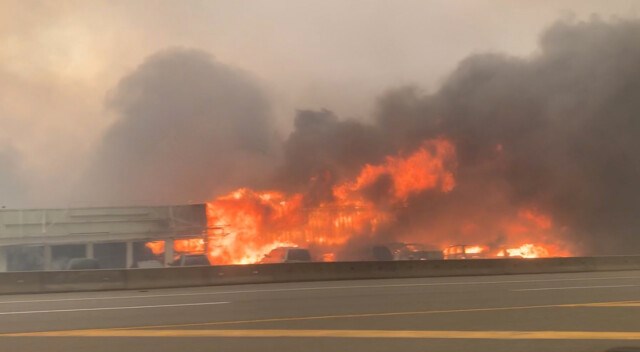Just before the BC NDP government’s wildfires state of emergency last summer, one of Emergency Management B.C.’s top officials sought crisis communications help from a Calgary consultant.
Pader Brach, the executive director of regional operations, used his own authority to hire Lovink Media Inc. (LMI) to teach him how to handle the media, including lessons on deflecting and deferring questions from reporters, according to documents released under freedom of information.
On July 19, 2021, the day before Premier John Horgan and Public Safety Minister Mike Farnworth declared the state of emergency, Brach contracted LMI for a maximum $9,400. The company is on a preferred supplier’s list through Government Communications and Public Engagement (GCPE). The threshold for public tendering government contracts is $75,000.
Brach appeared with other officials on a dozen media conference calls between July 4 and Aug. 26, 2021. The LMI standard “call up” fee is $5,000 plus GST, which covers handout material, preparation, initial 1.5-hour training session, seven follow-up one hour training sessions with a half-hour per session of preparation time.
“This fee will include an initial phone call and time to prepare and to review materials,” the contract said. “It will also include the training/coaching handout materials. Each follow up session past the seven will be charged an additional $400 per hour plus 0.5 hours for preparation.”
LMI invoiced $5,250 on July 20 and $1,470 on Aug. 23.
Brach did not respond for comment, but he did appear to enjoy the lessons. His testimonial is the first that appears on the LMI website: “Best instructor and media training I have received in 18 years of working in emergency management career fields. Really appreciated Jon [Lovink]’s passion for the topic. I feel way more confident as a result.”
The website for the $28-million-per-year GCPE says the full-service department includes “professionals with experience and education in government, media, corporate communications, citizen engagement, service design and web development.” Yet, it also maintains a list of external suppliers for outsourcing advertising, graphics, event production and writing.
“Within their departments, they should have in-house media training on how to properly answer questions, this is not rocket science,” said Kris Sims of the Canadian Taxpayers’ Federation. “It’s just another example of waste.”
The contract, under a section titled “outputs,” called for Brach to receive training as a “CREDible Spokesperson™”, with on-camera practice, non-verbal and para-verbal communications, interview dos and don’ts, video case studies and critical incident communications.
The LMI course list includes techniques for answering, or not answering, a question, such as recapping, bridging, hooking, deflecting, deferring and repetition, as well as rephrasing or restating tough or vague questions, and the difference between no comment and off the record.
The LMI website also includes testimonials from BC Parks’ Gina Bugslag, meat inspection veterinarian Dr. Ken Roblesky, B.C. Forestry Innovation Investment CEO Ken Baker, deputy BC Oil and Gas Commissioner James O’Hanley, and one simply titled “Government of B.C. Communications Staff Evaluation.”




